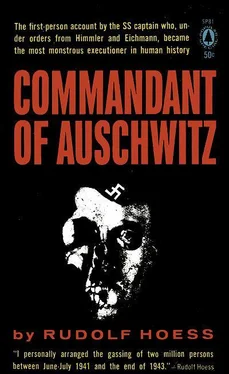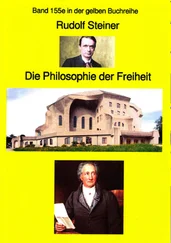Even Mildner [83]and Eichmann, who were certainly tough enough, had no wish to change places with me. This was one job which nobody envied me.
I had many detailed discussions with Eichmann concerning all matters connected with the “final solution of the Jewish question,” but without ever disclosing my inner anxieties. I tried in every way to discover Eichmann’s innermost and real convictions about this “solution.”
Yes, every way. Yet even when we were quite alone together and the drink had been flowing freely so that he was in his most expansive mood, he showed that he was completely obsessed with the idea of destroying every single Jew that he could lay his hands on. Without pity and in cold blood we must complete this extermination as rapidly as possible. Any compromise, even the slightest, would have to be paid for bitterly at a later date.
In the face of such grim determination I was forced to bury all my human considerations as deeply as possible.
Indeed, I must freely confess that after these conversations with Eichmann I almost came to regard such emotions as a betrayal of the Führer.
There was no escape for me from this dilemma.
I had to go on with this process of extermination. I had to continue this mass murder and coldly to watch it, without regard for the doubts that were seething deep inside me.
I had to observe every happening with a cold indifference.
Even those petty incidents that others might not notice I found hard to forget. In Auschwitz I truly had no reason to complain that I was bored.
If I was deeply affected by some incident, I found it impossible to go back to my home and my family. I would mount my horse and ride, until I had chased the terrible picture away. Often, at night, I would walk through the stables and seek relief among my beloved animals.
It would often happen, when at home, that my thoughts suddenly turned to incidents that had occurred during the extermination. I then had to go out. I could no longer bear to be in my homely family circle. When I saw my children happily playing, or observed my wife’s delight over our youngest, the thought would often come to me: how long will our happiness last? My wife could never understand these gloomy moods of mine, and ascribed them to some annoyance connected with my work.
When at night I stood out there beside the transports or by the gas chambers or the fires, I was often compelled to think of my wife and children, without, however, allowing myself to connect them closely with all that was happening.
It was the same with the married men who worked in the crematoriums or at the fire pits.
When they saw the women and children going into the gas chambers, their thoughts instinctively turned to their own families.
I was no longer happy in Auschwitz once the mass exterminations had begun.
I had become dissatisfied with myself. To this must be added that I was worried because of anxiety about my principal task, the never-ending work, and the untrustworthiness of my colleagues.
Then the refusal to understand, or even to listen to me, on the part of my superiors. It was in truth not a happy or desirable state of affairs. Yet everyone in Auschwitz believed that the commandant lived a wonderful life.
My family, to be sure, were well provided for in Auschwitz. Every wish that my wife or children expressed was granted them. The children could live a free and untrammeled life. My wife’s garden was a paradise of flowers. The prisoners never missed an opportunity for doing some little act of kindness to my wife or children and thus attracting their attention.
No former prisoner can ever say that he was in any way or at any time badly treated in our house. My wife’s greatest pleasure would have been to give a present to every prisoner who was in any way connected with our household.
The children were perpetually begging me for cigarettes for the prisoners. They were particularly fond of the ones who worked in the garden.
My whole family displayed an intense love of agriculture and particularly for animals of all sorts. Every Sunday I had to walk them all across the fields, and visit the stables, and we might never miss the kennels where the dogs were kept. Our two horses and the foal were especially beloved.
The children always kept animals in the garden, creatures the prisoners were forever bringing them. Tortoises, martens, cats, lizards: there was always something new and interesting to be seen there. In summer they splashed in the wading pool in the garden, or in the Sola. [84]
But their greatest joy was when Daddy bathed with them. He had, however, so little time for all these childish pleasures. Today I deeply regret that I did not devote more time to my family. I always felt that I had to be on duty the whole time. This exaggerated sense of duty has always made life more difficult for me than it actually need have been. Again and again my wife reproached me and said: “You must think not only of the service always, but of your family too.”
Yet what did my wife know about all that lay so heavily on my mind? She has never been told.
When, on Pohl’s suggestion, Auschwitz was divided up, he gave me the choice of being commandant of Sachsenhausen or head of DI. [85]
It was something quite exceptional for Pohl to allow any officer a choice of jobs. He gave me twenty-four hours in which to decide. It was really a kindly gesture in good will, a recompense, as he saw it, for the task I had been given at Auschwitz.
At first I felt unhappy at the prospect of uprooting myself, for I had become deeply involved with Auschwitz as a result of all the difficulties and troubles and the many heavy tasks that had been assigned to me there.
But then I was glad to be free from it all.
On no account did I wish to have another camp. I had truly had enough of the life, after a total of nine years in camp service, of which three and a half years had been spent at Auschwitz.
So I chose the position of chief of DI. There was nothing else for me to do. I was not allowed to go to the front. The Reichsführer SS had twice and firmly forbidden this.
I did not at all care for an office job, but Pohl had told me that I could organize the department as I saw best.
When I took up my post, on December 1, 1943, Glücks also gave me a completely free hand. Glücks was not pleased with my appointment, which brought me, of all people, so closely in contact with himself. Nevertheless, he bowed to the inevitable, since this was Pohl’s wish.
I had to regard my job, if I were not to look upon it as a nice, easy billet, as one in which I was primarily concerned to assist the commandants, and I saw all my functions from the point of view of the camps themselves. In fact I intended that the activities of the DI should be precisely the reverse of what they had hitherto been.
Above all I wanted my office to be in close and permanent contact with the camps and by personal visits I intended to form a firsthand judgment of their difficulties and grievances, so that I would be in a position to exert pressure on the higher authorities concerning what could and should be done for them.
In my new office I could now, thanks to the documents, orders, and entire correspondence filed there, follow the development of all the camps since Eicke’s inspectorate and obtain a complete picture.
There were many camps of which I had no personal knowledge at all. The entire correspondence between the Inspector of Concentration Camps and the camps themselves, unless solely concerned with the distribution of labor or with matters of health or administration, was filed in the DI offices. It was thus possible to gain a bird’s-eye view of all the camps. But no more than that. What actually happened in the camps, what they looked like was not to be found in the documents and archives. That could only be discovered by walking through the camps oneself and keeping one’s eyes open. And this was what I proposed to do.
Читать дальше












